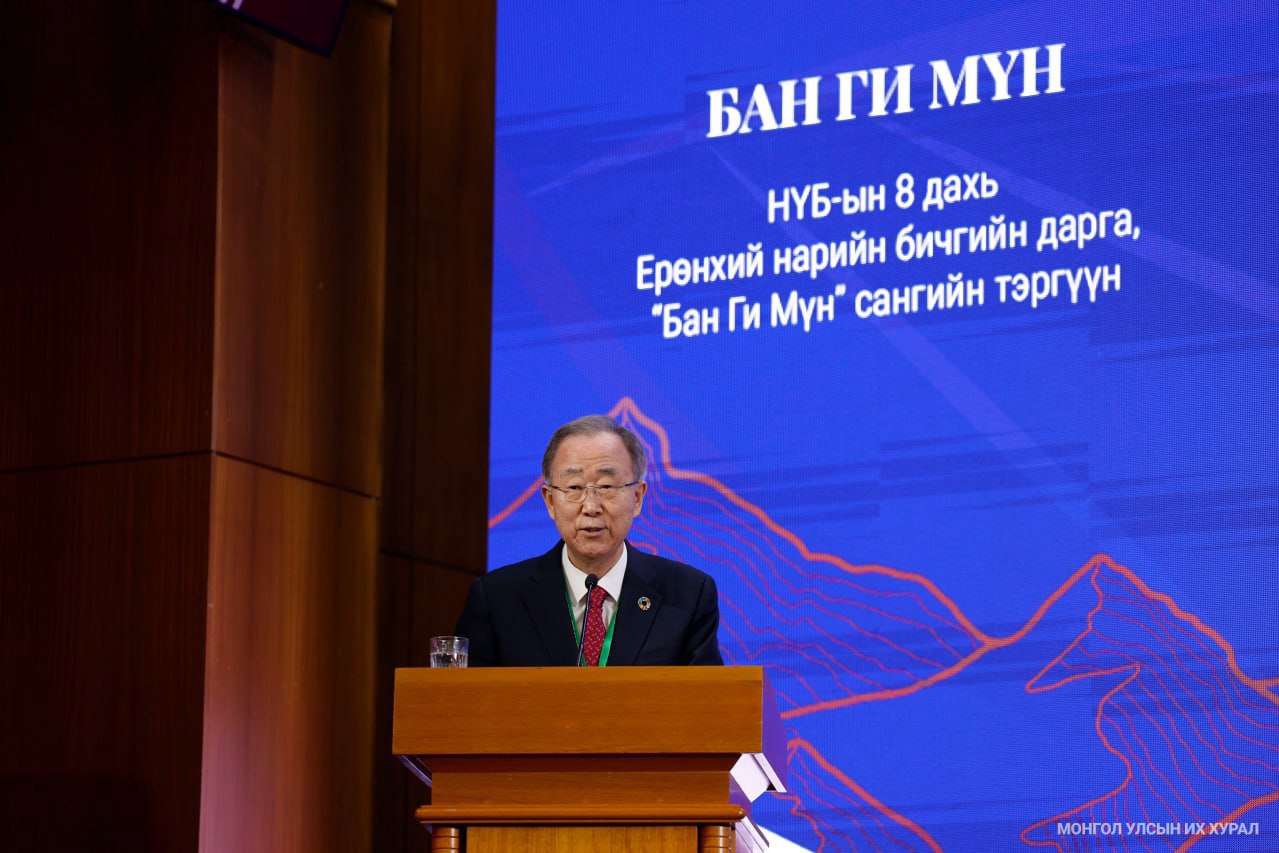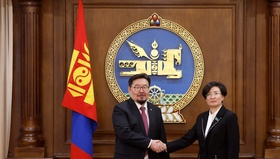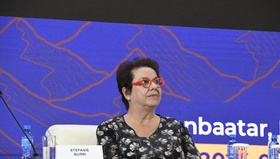The Honorable Gombojav Zandanshatar, Chairman of the State Great Hural of Mongolia,
The Honorable Nurlanbek Shakiev, Speaker of the Supreme Council of Kyrgyz Republic,
The Honorable Kim Young-joo, Deputy Speaker of the National Assembly of the Republic of Korea,
The Honorable Sandor Lezsak, Speaker of National Assembly of Hungary,
The Honorable Rakhmetova Assem Kalashbaeva, Member of the Senate of the Parliament of Kazakhstan,
Professor Shin Gi-wook of Stanford University,
Excellencies, Distinguished Guests, Ladies & Gentlemen,
It is my great pleasure to welcome all of you to the Second Trans-Altai Sustainability Dialogue here in this beautiful country of Mongolia.
I applaud the vision and insight of the Chairman Zandanshatar who made the success of this event possible.
Last year, we discussed and actively exchanged views on the important agenda of gender equality, which constitutes one of core values of the 2030 Sustainable Development Goals.
This year’s focus is goal number 16, “Peace, Justice and Strong Institutions.”
I am of the view that the people of Mongolia and Korea share a kindred spirit of inclusiveness and resilience.
This spirit represents the overarching values for implementing the Sustainable Development Goals for all and leaving no one behind. And this very same spirit provides the source of our common efforts for peace and justice in the world.
Considering the complex and turbulent global situation, the topic this year is both very relevant and timely.
As you may be aware, the Ban Ki-moon Foundation promotes the three pillars of the UN.
These include peace and security, development, and human rights. The three pillars are inherently intertwined and steer the direction forward for achieving the 2030 SDGs.
Therefore, the BKM Foundation is actively collaborating with various international organizations and key stakeholders to put impetus into realizing the SDGs.
The Trans-Altai Sustainability Dialogue is one of the most effective ways of activating new research and synergizing innovative policy partnerships between noted experts from the US and Asia, and between governments and non-state actors.
In this regard, just as last year, the Ban Ki-moon Foundation is proudly participating as a co-organizer with Walter H. Shorenstein Asia-Pacific Research Center of Stanford University in this Dialogue.
Distinguished guests, Ladies and gentlemen,
We find ourselves at the center of a variety of converging crises and increased uncertainty. It will have profound implications for our planet, economies, and societies.
Geopolitical confrontations are surging, and the ongoing war in Ukraine and grave situation in the Middle East represent the most dangerous moments for global peace and security in decades.
The climate crisis is also deepening with surging heat, ising sea levels, raging floods, and burning wildfires.
These global challenges have underlined their fundamental interconnectedness and need for global solutions. Indeed, it is evident that we require a holistic and multilateral approach to the great challenges that we are facing now.
The SDGs’ vision is to ensure that no one is left behind. In order to meet this noble aspiration, all stakeholders should strengthen further cooperation, innovation, engagement, and action. Then, we can advance the path towards peace, justice, and strong institutions.
Over the last eight years since their adoption, the SDGs have made tangible progress on bettering maternal mortality rates, combatting poverty and hunger, and improving the quality of water and sanitation.
However, ongoing war in Ukraine and conflict in the Middle East are seriously impacting global development. This has compounded pre-existing pressure from climate change, inflation, and supply chain issues; and has resulted in dire multiple crises of food, energy, and finance.
But now is the time we must not lose focus. The SDGs still offer us a viable road map to help rebuild societies back better, greener, and more resilient from such challenges.
During the next six years, progress in innovation, technology, and science will also be essential in delivering on all SDGs, from poverty eradication to food security, to water and sanitation, and climate change. Such new innovations hold great promise for the SDGs.
We also need an “all hands-on deck” approach where everyone joins together in partnership to catalyze ownership, participation, and involvement from all stakeholders.
As such the Second Trans-Altai dialogue offers a robust platform to implement the SDGs; in particular, SDG 16 on peace, justice and strong institutions in Asia and beyond.
Excellencies, Distinguished Guests, Ladies & Gentlemen,
Since industrialization, humanity has achieved remarkable economic growth and technological progress.
However, in the process, serious environmental damages occurred. Global warming and climate change have ensued as a result of reckless, human-made carbon emissions.
Climate change has been ushering in dire risks and elevated instability. Frankly, no one is safe. If we do not act now, humanity’s survival will be greatly imperiled. The core of such action is to drastically slash the planet’s carbon emissions and hit net zero. There is no other way around.
The Paris Agreement offers us our best hope to persevere over the serious threats to our planet, but we must urgently step-up implementation efforts. What is needed now is an unprecedented global effort propelled by multilateralism, solidarity, and partnership.
And we have no time to spare. What happens is up to us, so we must act now. Otherwise, we will leave the planet earth besieged by flames, heat and floods to our children.
With this in mind, all stakeholders need to strengthen their actions to cut emissions and expedite the rapid decarbonization of the global economy to hit net zero.
Without overcoming the climate crisis, the 17 goals of SDGs, including peace, justice and strong institutions, will be all futile.
Excellencies, Distinguished Guests, Ladies & Gentlemen,
I humbly call on you to elevate your discussions and share best practices at this timely event and beyond. With your active efforts, I am confident that we can harness this time of uncertainty as a gateway towards a more sustainable, healthy and prosperous the planet, and its ecosystems.
Again, the vision encompassed in SDG 16 is the very core of the 2030 Agenda. If we cannot secure peace, security, and strong institutions at all levels, the other goals of SDGs cannot be achieved or at least cannot be institutionalized.
Some data demonstrates that SDG 16 is falling far behind. That is why the Second Trans-Altai Dialogue takes this goal as a subject to expedite its implementation forward.
We now stand at the midway point to 2030. By identifying our successes and failures, we can direct our resources and efforts more effectively, fostering tangible change.
Moreover, to accelerate our progress, we must expand partnerships and collaboration among governments, civil societies, and private sectors.
I am therefore quite inspired by this event here today and stand ready to contribute my attention and resources with the partners of Mongolia and the Shorenstein Asia-Pacific Research Center of Stanford University.
In this connection, I urge all of you, the policy-makers, academics, and business leaders here at this event to continue to make progress on SDG 16 and the SDGs as whole in your spheres. Your contributions and constant commitment will certainly encourage others to join you in working toward a world where peace and justice prevail.
Together, we can do what the future generations anticipate from our generation.
As we embark upon our common journey toward a better future for all, this Second Trans-Altai Sustainability Dialogue will surely expand its impact far across the border of Mongolia, resonating across Asia and beyond.
With solidarity and strong will, we shall overcome all the barriers and chart a new direction for the world where justice and peace prevail for all.
Finally, I would like to commend the tireless efforts of the staff and volunteers for their successful preparations of this wonderful and meaningful event.
I thank you.

 Eng
Eng  Монгол
Монгол


